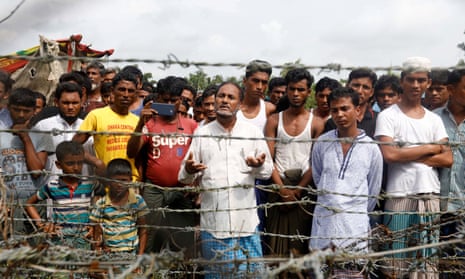Aid groups have warned of a looming humanitarian disaster after coronavirus was detected for the first time in the sprawling camps that host about one million Rohingya refugees.
The camps in Cox’s Bazar, Bangladesh, which are more densely populated than some of the world’s busiest cities, have been under lockdown since 14 March in an attempt to stop the virus from spreading.
As the number of coronavirus infections has continued to rise in Bangladesh, health experts and Rohingya community leaders have become increasingly concerned about possible outbreak among refugees. On Thursday, such fears were confirmed when the UN announced that an ethnic Rohingya refugee and another person had tested positive for Covid-19. Humanitarian groups warn the virus could race through the camps, where families live with up to 10 people in a room in sweltering heat, with limited access to clean water. Households are forced to queue to access food at communal distribution points, making social distancing impossible.
On top of overcrowding, many refugees, who fled persecution in Myanmar, have underlying health conditions or have not received standard immunisations, according to health experts.
The charity Médicins Sans Frontières warned that before Covid-19, around a third of patients it treated presented with respiratory tract symptoms, such as shortness of breath, meaning they are at higher risk of the disease. Health services for those who get sick is limited.
Community members have volunteered to share information about the disease, but such awareness-raising activities have been hampered by an internet ban imposed on the camps. The blackout has made it harder for people to access reliable advice or news updates, and has fuelled a sense of panic among some.
Mohammad Selim, 36, whose family of six live in the Kutupalong camp in Cox’s Bazar, said people were very fearful. “Everyone is talking about how there are one or two confirmed cases of in the camp. From what I’ve heard about this disease, this is it, ” he said.
NGOs have been sharing health guidance, he added, but he worries that the virus will spread easily as people move within or between the 34 camps that host refugees. “People are going in and out of the camps freely. They are creating gatherings, the local tea-stalls are crowded. That’s not good,” said Mohammad Selim. He tries to keep his four children inside the home, a room divided by a mud wall, but it is difficult to keep them indoors at all times, he added.
The lockdown has been tightened following the confirmation of new cases, according Shafi Ullah, a community leader in Kutupalong camp. He urged the authorities to lift the ban on internet services. “This will help our people…the internet is a massive source of information,” he said.
Testing began in the Cox’s Bazar district in early April and, as of Thursday, 108 refugees have been tested. “Once a case is confirmed we have rapid investigation teams, different health professionals and people trained in contact tracing who will investigate the case. This is happening now,” said Louise Donovan, spokesperson for the UN Refugee Agency.
Across Bangladesh, the government has so far has reported 18,863 cases of Covid-19 and 283 deaths. Dr Shamim Jahan, Save the Children’s health director in the country, said in a statement the virus already had overwhelmed health services.
“There are only an estimated 2,000 ventilators in all of Bangladesh, serving a population of 160 million people. In the Rohingya refugee camps – home to nearly a million people – there are no intensive care beds at this moment,” he said.
“Now that the virus has entered the world’s largest refugee settlement in Cox’s Bazar we are looking at the very real prospect that thousands of people may die from Covid-19. This pandemic could set Bangladesh back by decades.”
The Burmese Rohingya Organisation UK said the international community needed to provide greater resources to help protect Rohingya refugees, and called on the Bangladesh government to allow humanitarian work to continue in the camps.
“We urge Bangladesh to lift all restrictions on aid groups’ access to people who need them during the pandemic, and to take all necessary steps to prevent the virus from spreading further. The international community must step in and support Bangladesh in these vital efforts,” said Tun Khin, president of the group, who added that an internet ban, imposed by Bangladesh, should also be lifted.
“The Rohingya people in Cox’s Bazar have fled for their lives from Myanmar, where the government is waging a brutal genocide,” he said. “The world must now ensure that a disaster of epic proportions is avoided the camps where they have found safety.”
